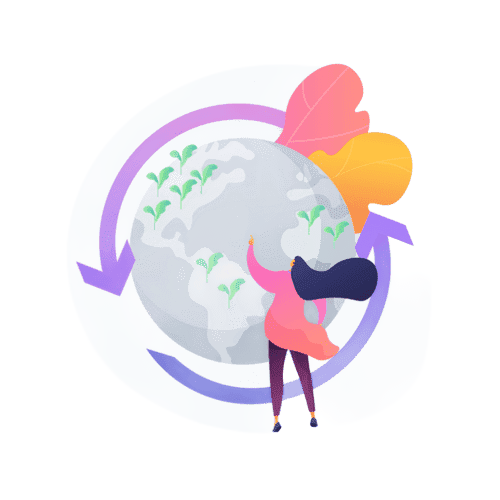The Future of Innovation: How Industry 4.0 is Driving Sustainable Development
Industry 4.0 is transforming manufacturing and business operations by integrating digital technologies to drive sustainable innovation. This article explores the role of Industry 4.0 in fostering eco-friendly practices, enhancing efficiency, and optimizing resource utilization. A structured roadmap outlines how businesses can leverage Industry 4.0 for long-term sustainability and competitive advantage.

The Era of Industry 4.0 and Sustainability
The world is at the forefront of a transformative industrial revolution—Industry 4.0. This digital-driven era is not just about automation and efficiency; it is reshaping industries by integrating sustainability into core business practices. Industry 4.0 is an enabler of sustainable innovation, bringing advanced technologies such as the Internet of Things (IoT), Artificial Intelligence (AI), big data analytics, and additive manufacturing to drive environmental and economic benefits. But how exactly does this revolution contribute to sustainable innovation? This article explores the roadmap to sustainable innovation and the pivotal role Industry 4.0 plays in achieving it.
Understanding Industry 4.0: A Paradigm Shift in Manufacturing
Industry 4.0 is characterized by the integration of digital technologies into manufacturing and business processes. It builds on the following foundational technologies:
- Artificial Intelligence & Machine Learning: Enhancing decision-making processes and optimizing energy consumption.
- Big Data & Analytics: Facilitating predictive maintenance and efficiency improvements.
- Internet of Things (IoT): Enabling real-time monitoring and control of operations.
- Blockchain: Ensuring transparency and traceability in supply chains.
- Additive Manufacturing (3D Printing): Reducing waste and enabling resource-efficient production.
- Cyber-Physical Systems (CPS): Connecting physical processes with digital capabilities for smarter manufacturing.
The Role of Industry 4.0 in Sustainable Innovation
A systematic review of Industry 4.0’s role in sustainable development identifies 11 core functions that facilitate sustainable innovation:
1. Advanced Manufacturing Competency (AMC)
- Enhances production efficiency while minimizing waste and energy use.
- Promotes lean and green manufacturing practices.
2. Green Absorptive Capacity Development (GACD)
- Encourages businesses to recognize and integrate environmental knowledge.
- Enhances capabilities to develop eco-friendly innovations.
3. Green Process Innovation Capacity (GPSIC)
- Focuses on modifying business processes to be more eco-friendly.
- Uses Industry 4.0 technologies to optimize energy consumption.
4. Green Product Innovation Capacity (GPTIC)
- Supports the development of sustainable products through digital simulations and additive manufacturing.
- Enables rapid prototyping of eco-friendly designs.
5. Interfunctional Collaboration and Learning (ICL)
- Breaks down silos in organizations to foster sustainability-focused teamwork.
- Enhances knowledge-sharing across departments and stakeholders.
6. New Product Development Competency (NPDC)
- Accelerates the innovation of green products by leveraging digital design tools.
- Enables companies to react swiftly to changing environmental demands.
7. Product Life-Cycle Management Capability (PLMC)
- Ensures sustainable practices across a product’s entire life cycle.
- Implements digital twin technology to track environmental impact.
8. Sustainable Innovation Orientation Development (SIOD)
- Aligns corporate strategy with sustainability goals.
- Encourages businesses to invest in green innovation.
9. Sustainable Partnership and Collaboration (SPC)
- Strengthens alliances with green technology providers and eco-conscious partners.
- Facilitates knowledge-sharing and co-development of sustainable solutions.
10. Sustainable Talent Management (STM)
- Promotes workforce training in sustainability best practices.
- Utilizes AI-driven HR solutions to recruit eco-conscious talent.
11. Value Chain Integration (VCI)
- Enhances transparency and efficiency in supply chains.
- Implements IoT and blockchain to track sustainability metrics.
%
Machine Downtime Reduction
By employing IoT, advanced sensors, and AI/ML for predictive maintenance, companies have reduced machine downtime by up to 50%. Source: Cognizant
%
Quality Enhancement
Implementing Industry 4.0 solutions has led to nearly a 20% improvement in product quality.
Source: Cognizant
The Roadmap to Sustainable Innovation Under Industry 4.0
The transition to sustainable innovation requires a structured approach. The roadmap involves the following stages:
1. Developing Interfunctional Collaboration & Learning
- Foster a culture of sustainability across all departments.
- Implement digital tools to streamline communication.
2. Integrating Value Chain Partners
- Engage suppliers and distributors in sustainability initiatives.
- Utilize real-time data for optimizing resource usage.
3. Building Advanced Manufacturing Competency
- Invest in smart factories and automated green manufacturing technologies.
- Leverage AI to monitor and reduce environmental footprints.
4. Enhancing Green Product and Process Innovation
- Deploy Industry 4.0 technologies for eco-friendly product development.
- Use blockchain for ethical sourcing and supply chain traceability.
5. Measuring & Scaling Sustainable Innovation
- Define key performance indicators (KPIs) for sustainability.
- Expand successful innovations across business units and industries.
Challenges & Future Directions
While Industry 4.0 presents vast opportunities for sustainability, it also introduces challenges:
- High Initial Costs: Implementing smart technologies requires significant investment.
- Data Security & Privacy Risks: Increased connectivity exposes businesses to cyber threats.
- Workforce Adaptation: Employees need to be reskilled to work with digital tools.
- Regulatory Compliance: Businesses must navigate complex sustainability regulations.
Future research should focus on the development of policies that incentivize green digital transformation, address ethical concerns surrounding automation, and explore the role of AI in optimizing circular economy models.
Conclusion
Industry 4.0 is more than an industrial revolution; it is a pathway toward a sustainable future. By leveraging digital transformation, businesses can enhance efficiency, reduce environmental impact, and create long-term value for all stakeholders. However, the success of this transition depends on strategic investments, collaboration, and policy support. As we move forward, embracing Industry 4.0 for sustainability is not just an option—it is an imperative for businesses and societies alike.
References
- Ghobakhloo, M., et al. (2021). Industry 4.0, Innovation, and Sustainable Development: A Systematic Review and a Roadmap to Sustainable Innovation.
- Digital Transformation and Innovation for a Sustainable Future, MDPI
- The Impact of Digital Transformation on the Sustainable Development of Manufacturing Firms, Journal of Economics and Development
- Digital Transformation as an Enabler of Sustainability Innovation and Performance, RESEARCHGATE
- Digital Transformation Drives Sustainable Innovation Capability, MDPI
- Digital Transformation, Smart Technologies, and Eco-Innovation, Sage Journals
Wanna know more? Let's dive in!
ISO 9001 Checklist: A Step-by-Step Guide to Implementation
[dsm_gradient_text gradient_text="ISO 9001 Checklist: A Step-by-Step Guide to Implementation" _builder_version="4.27.0" _module_preset="default" header_font="Questrial|||on|||||" header_text_align="center" header_letter_spacing="5px" filter_hue_rotate="100deg"...
Read this before you read ISO 9001
[dsm_gradient_text gradient_text="The 7 principles of quality management" _builder_version="4.27.0" _module_preset="default" header_font="Questrial|||on|||||" header_text_align="center" header_letter_spacing="5px" filter_hue_rotate="100deg" hover_enabled="0"...
When AI Met ISO 9001
[dsm_gradient_text gradient_text="When AI Met ISO 9001" _builder_version="4.27.0" _module_preset="default" header_font="Questrial|||on|||||" header_text_align="center" header_letter_spacing="5px" filter_hue_rotate="100deg"...
Sustainability Through Collaboration Building a Greener Future Together
[dsm_gradient_text gradient_text="Sustainability Through Collaboration: Driving Change Across Industries" _builder_version="4.27.0" _module_preset="default" header_font="Questrial|||on|||||" header_text_align="center" header_letter_spacing="5px"...
Why Sustainable Car Design Matters
[dsm_gradient_text gradient_text="A Comprehensive Exploration of Agile Auditing" _builder_version="4.27.0" _module_preset="default" header_font="Questrial|||on|||||" header_text_align="center" header_letter_spacing="5px" filter_hue_rotate="100deg"...
Cultivating a Quality Culture: Guide to Organizational Excellence
In today’s rapidly evolving global marketplace, organizations across various sectors are recognizing the critical importance of fostering a culture centered on quality. This emphasis is not merely about adhering to standards or regulations but involves embedding quality into the very fabric of an organization’s ethos, operations, and interactions. A robust quality culture ensures that every member, from top leadership to frontline employees, is committed to continuous improvement, customer satisfaction, and operational excellence.
The Hidden Costs of Human Error in Healthcare
Human error is a significant challenge in healthcare, where even minor mistakes can have serious consequences. Unlike other industries, errors in healthcare directly affect human lives, making patient safety a top priority. The increasing complexity of modern healthcare, with its integration of technology and electronic health records, introduces both opportunities and challenges. The need for quality assurance is paramount in reducing human errors and ensuring high standards of patient care.
Consistency in Quality: The Foundation of Total Quality Management
In today’s fast-paced and competitive business landscape, ensuring quality is paramount for survival and success. Concepts such as Total Quality Management (TQM), Lean Manufacturing, and Time-Based Competition have gained prominence as organizations strive to enhance efficiency, reduce waste, and improve customer satisfaction. However, one of the most overlooked yet critical factors for the successful implementation of these quality programs is consistency in quality. Without consistency, even the most well-planned quality strategies may fail to yield the desired results.
Software Engineering Process and Quality Assurance Framework
The automotive industry is experiencing rapid transformation, driven by advances in technology, increasing competition, and evolving customer expectations. To stay ahead in this dynamic landscape, companies must continuously innovate while optimizing costs. One of the most effective strategies for achieving these objectives is outsourcing software development and engineering processes.
Elevating Software Quality in Automotive Engineering
In the ever-evolving landscape of automotive engineering, ensuring high software quality is a key challenge. With the increasing complexity of vehicle functionalities and the integration of advanced driver-assistance systems (ADAS), maintaining stringent quality standards is essential. Volkswagen introduced the Software Quality Improvement Leader (SQIL) initiative to bridge the gap between software quality and supplier collaboration, ensuring the highest standards in automotive software development.
The Future of Batteries: How Organic Batteries Are Changing the Game
Organic batteries are on the rise, offering safer, greener, and cheaper alternatives to traditional batteries. As research progresses, we can expect longer-lasting, flexible, and biodegradable batteries powering our future devices.
Organic Thermoelectrics: Turning Heat into Power
Imagine if you could charge your phone just by wearing your hoodie, or if your laptop could recycle its own heat to power itself. Sounds futuristic, right? Well, organic thermoelectrics are making this a reality! This cool (or should we say hot?) technology is all about using special materials to turn wasted heat into usable electricity.












